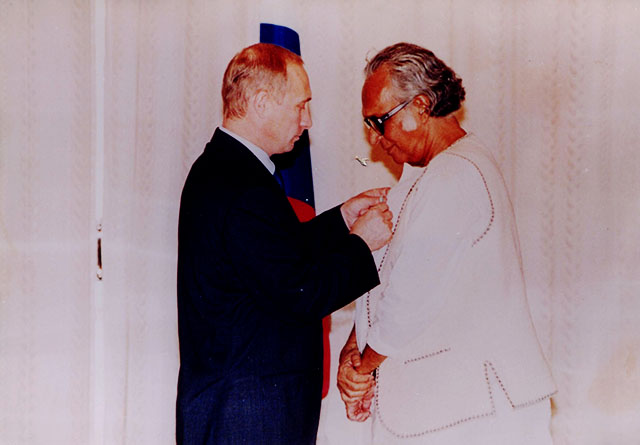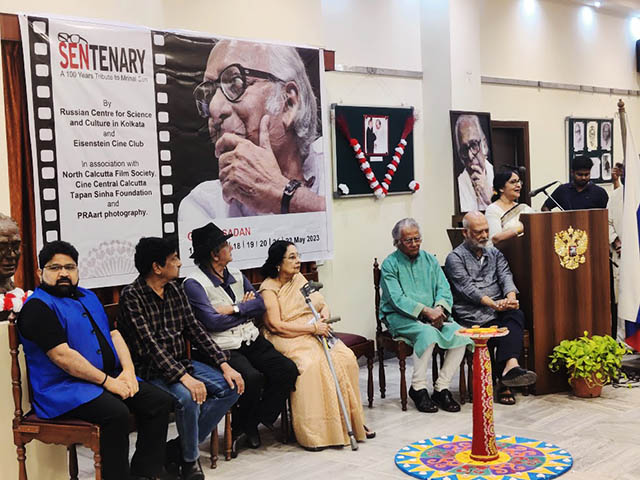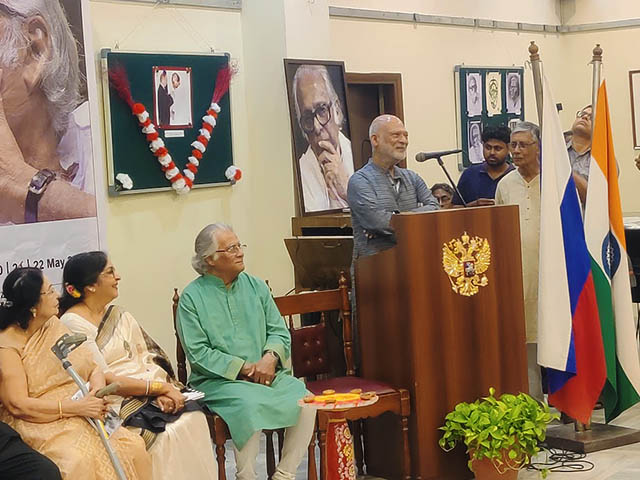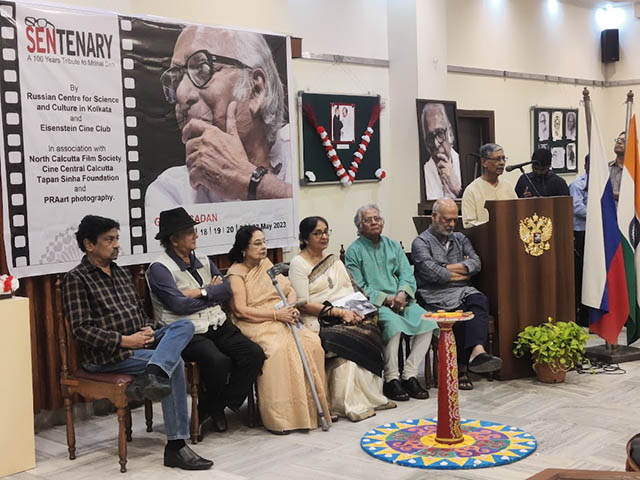Even as films today, like the “Kashmir Files” or “The Kerala Story“, are increasingly coming under the radar for their politically-motivated themes, prominent Bengali film and cultural personalities celebrated the centenary of legendary filmmaker Mrinal Sen on May 15th applauding the ardent Marxist for staying away from using cinema as a means of propaganda.
During the event, “Sentenary”, organised at Kolkata’s Russian Centre for Science and Culture, known as Gorky Sadan, gathered artists discussed that while Sen’s overtly political films exhibited his faith in Marxism, he never became a propagandist but remained loyal to storytelling.
During large-scale political unrest throughout India and West Bengal, especially in and around Kolkata during the 1970s, Sen shifted his focus from enemies outside to his own – middle-class society. It was during this phase he won a large number of international awards.
Sen received awards from almost all major film festivals, including Cannes, Berlin, Venice, Karlovy Vary, Cairo, Chicago, Montreal, and Moscow.

An experimental filmmaker who had the courage to venture into unknown territory, a senior mentor who provided a fillip to the careers of many young artists and many more such incidents were recalled by the prominent Bengali cinema personalities and family members of Sen who attended the event.
Even after five years of his demise, memories of Mrinal Sen are still fresh in the mind of everyone he had worked with. From internationally acclaimed actor, director, musician, and cinematographer Goutam Ghose to renowned Bangladeshi filmmaker Tanveer Mokammel, the illustrious actor and dancer Mamata Shankar, along with National Award winner Madhabi Mukherjee plus many more stalwarts of Bengali cinema, hailed the director who was not just their colleague but a guide, mentor, and friend for life.

The event commenced with an opening speech by Gautam Ghosh, the Programme Officer of Gorky Sadan. Mukherjee, the veteran actor was the first one to take the podium and express her feelings about the eclectic Sen. To her, Sen was not just an unmatched filmmaker but an extraordinary human being as well. This humane side, easy disposition, and close affinity with anyone he came in contact with made Sen unforgettable.
Actress Mamata Shankar recalled how Sen helped her to step into her film career and always guided her throughout the journey. She spoke about the humorous Mrinal Sen, and how inquisitive he was.
Ghose spoke about Sen’s ability to improvise during the shooting and how he was far ahead of his times when he made films like “Kolkata 71”. Ghose said Sen didn’t just befriend people younger and junior to him with utmost ease but also made them feel comfortable in his presence.
Vats, inspired by Sen’s “Ekdin Pratidin” during his college days in New Delhi, recalled how Sen made a revolutionary attempt during his 1986 film Genesis in which he didn’t use dubbing but natural location sound, something directors of that era won’t try.
All the cine stars in the event spoke candidly and extensively about their harbour and lodestar who contributed to their movie careers in more ways than one. Goutam Ghose reiterated how Sen granted him a loan of Rs 10,000 from the UCO Bank as a patron to complete his project “Hungry Autumn” based on the Bengal famine of 1974. This documentary was Ghose’s first major film.
Pathik Vats, the Filmfare award winner for “Sarfarosh” in the best dialogues category, spoke his heart about his cine idol – Sen. Long before he had a chance to work with Sen, he pined to be associated with him. However, at that time, it was pretty unlikely for a novice like Vats. But as luck would have it, during the making of “Genesis”, starring Nasiruddin, Om Puri and Shabana Azmi, the film crew demanded a skilled dialogue writer well-versed in Hindi and English, and Vats fulfilled the criteria perfectly. Vats spoke about his fanboy moment when he first met Mrinal Sen and how he reacted when he was hired to work with him.
Kunal Sen, Sen’s son, shared family moments with the audience and expressed that his father was an atheist and did not pay much heed to the idols of Hindu gods and goddesses. However, when it came to showing respect for the idols of Marxist ideologues like Stalin, he turned into a devout follower.

The “Sentenary” event at Gorky Sadan will continue until May 22nd, except May 17th and May 21st. There will be daily talk shows, and presentations by cinemates, consorts, critics, friends and comrades of Mrinal Sen, including Adhrisya Kumar, Amitabha Nag, Anjan Bose, Anjan Dutt, Ashoke Vishwanathan, Atanu Ghosh, Biplab Chatterjee, Jyotiprakash Mitra, Nabinanda Sen, Pratiti Ghosh, Priyadarshini Chakraborty, Raja Mitra, Raja Sen, Ranjit Mullick, Sekhar Das, Siladitya Sen, Someswar Bhowmik, Vidyarthi Chatterjee and others.
Apart from the Russian Centre for Science and Culture in Kolkata, the Eisenstein Cine Club, North Calcutta Film Society, Tapan Sinha Foundation and Cine Central Calcutta are the co-organisers of the event. The exhibition timings are 3.30pm to 5.30pm.


